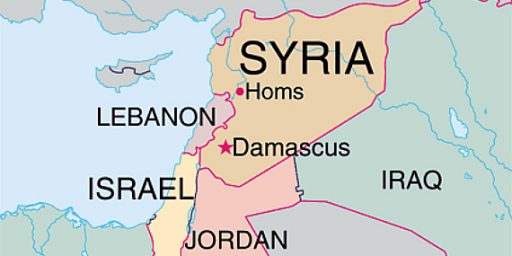Hezbollah Training Iraq’s Mahdi Army
Michael Gordon and Dexter Filkins report that Hezbollah is training al-Sadr’s Shiite militia.
A senior American intelligence official said Monday that the Iranian-backed group Hezbollah had been training members of the Mahdi Army, the Iraqi Shiite militia led by Moktada al-Sadr. The official said that 1,000 to 2,000 fighters from the Mahdi Army and other Shiite militias had been trained by Hezbollah in Lebanon. A small number of Hezbollah operatives have also visited Iraq to help with training, the official said. Iran has facilitated the link between Hezbollah and the Shiite militias in Iraq, the official said. Syrian officials have also cooperated, though there is debate about whether it has the blessing of the senior leaders in Syria.
The intelligence official spoke on condition of anonymity under rules set by his agency, and discussed Iran’s role in response to questions from a reporter.
The interview occurred at a time of intense debate over whether the United States should enlist Iran’s help in stabilizing Iraq. The Iraq Study Group, directed by James A. Baker III, a former Republican secretary of state, and Lee H. Hamilton, a former Democratic lawmaker, is expected to call for direct talks with Tehran.
The claim about Hezbollah’s role in training Shiite militias could strengthen the hand of those in the Bush administration who oppose a major new diplomatic involvement with Iran.
The new American account is consistent with a claim made in Iraq this summer by a mid-level Mahdi commander, who said his militia had sent 300 fighters to Lebanon, ostensibly to fight alongside Hezbollah. “They are the best-trained fighters in the Mahdi Army,” he said, speaking on condition of anonymity.
This is hardly surprising, Josh Marshall‘s skepticism notwithstanding. Essentially, we have al Qaeda backing the Sunni insurgency and Hezbollah backing the Shiite insurgency. Despite their natural animosity toward each other, they have mutual enemies in the United States and Israel.
Marc Schulman headlines his summary of this report “The Links in the Axis of Evil” and observes that it “brings into sharp relief the nature of the enemy we’re confronting in the Middle East.”
Ed Morrisey says it is obvious that “Iran and Syria (who also figures prominently in the Hezbollah-Mahdi arrangements) do not have any interest in moderation and democracy in the region” and that, therefore “notions of engagement with these two notorious terrorist-supporting states should be a non-starter.”
Phil Carter, citing related pieces in WaPo and Newsweek, takes the opposite lesson:
What’s clear from these stories is that the Sadr organization is winning hearts and minds in Iraq by the million. Sadr has become the most popular politician in Iraq — he commands far more support and respect than Maliki or any of his predescessors, and probably more even than Grand Ayatollah Sistani. No Sunni leader even comes close, except perhaps Saddam Hussein, who many Iraqis still revere. Sadr’s organization and its militia, the Mahdi Army, dominate the political, social, economic and security life of Iraq, particularly for its Shiite majority. In many places, such as Sadr City, they don’t just displace the government — they are the government. Any political solution in Iraq will have to take this reality into account. No matter how uncomfortable it may feel, we must be prepared to negotiate with and work with Moqtada Sadr and his organization in order to move Iraq forward. Without his buy-in, no peace will take root.
Carter is likely right that we have little choice in that matter. All wars, after all, end in negotiation. Even while demanding unconditional surrender, we ultimately negotiated with the Nazis and imperial Japan. Ronald Reagan even negotiated with the Evil Empire.
Unfortunately, Christopher Hitchens makes a mighty convincing argument why it’s unlikely to work out in this case. He notes the effectiveness of random terrorism and violence throughout the region.
This is the huge advantage that the forces of nihilism possess in the region. In the short term, it is true, a prudent Syrian or Iranian government would not wish for an implosion in either Lebanon or Iraq, and a sensible Pakistani regime ought to desire a peaceful Afghanistan. A next-door war of all against all can lead to interethnic and interconfessional rivalry within their own societies and in the meantime is a threat to the orderly exploitation of things—like the trade in narcotics—that benefit the regimes and their clientele. However, chaos is a tremendous way of waging asymmetrical warfare and canceling the vast military superiority of the United States. It also catches the attention of those locals who are caught in the middle and who know from long and bitter experience how to sniff the wind. Listen to us, say the Ahmadinejads and their proxies, we will always be here. Can you say the same for the Americans? Many considerations, including intense inter-Islamic Shiite-Sunni hatred, divide Ahmadinejad and Assad from the forces of al-Qaida, which would also prefer to see Iraq, Lebanon, and Afghanistan in ruins than have these countries get a chance of modernism and secularism. But on this essential point, they are in agreement, and their wrecking activities tend toward the same objective. In due course, they will certainly fight each other. But the ruins over which they will be disputing will, they believe, have at least been abandoned by the West, as Afghanistan was after 1989. And the interest of human-rights monitors and others will have slackened accordingly.
If this indeed proves to be the outcome, the victors will be able to rub their eyes at how easy it was. Barely five years after the eviction of the Taliban, three and a half years after the fall of Saddam Hussein, and a year and a half after the Syrian army was forced out of Beirut by a show of mass popular and democratic unity, the memory of those brave fingers marked with the purple ink of the franchise has almost vanished. Tribalism and gangsterism are back, in a big way, with heavy state support from across the frontiers. And the United States, it seems, cannot wait to confirm the impression that it would rather deal with the aggressors. If the latest assassination in Lebanon caused any embarrassment to the enthusiasm of the Baker-Hamilton team for direct talks with Damascus and Tehran, the embarrassment wasn’t evident.
[…]
The objectionable thing about the proposed Baker-Hamilton “talks” is not that they are talks but that they give the impression of looking for someone to whom to surrender.
[…]
Those who blame the violence in Baghdad on the American presence must have a hard job persuading themselves that the mayhem in Beirut and Afghanistan—and the mayhem that is being planned and is still to come—is attributable to the same cause. But the instigators are the same in all cases: the parties of god and their foreign masters. If we cannot even stand up for Lebanon in this crisis, even rhetorically, then we are close to admitting that these parties have won.
I fear he may be correct. I’m Realist enough to understand the need for hard compromise, dealing with bad guys in order to stave off worse guys, and picking one’s fights even if it means innocents get victimized. Still, a hallmark of Realism is that sometimes military power must be used to secure one’s national interests. It’s hard to conceive of anything more important to U.S. security than defeating these “forces of nihilism” who are trying to kill us.
What’s unclear at this point is what our options are in these related crises. Aside from whether we have the patience and backbone to fight this Long War–the indications would seem to be negative on that front–there is serious question as to whether force can be effective. Is it too late to defeat the Iraqi insurgency? Is regime change the only answer in Iran and Syria? If so, do we have the ability to control the aftermath better than we did in Iraq?
Update: Dave Schuler captures my thoughts quite succinctly: “[W]hile I have no problem with face-to-face negotiations with the Syrians and Iranians it’s hard for me to see how anything they might be willing to accept in trade for taking the pressure off Iraq will remotely be worth the exchange.”




They are going about this all wrong. Divide the country into three separate federations and let them each form their own government. Right now, we are trying to force people that hate each other to get along. It doesn’t make sense.
Hezbollah can move freely throughout the country because there is no rule of law. If you divide it up, at least you can guard the borders.
Hezbollah is NOT running around in Iraq. The article states the Mahdi Army personnel are going to Lebanon for training. Even so, the Mahdi do not have free run in Iraq. Let them try to do that in Anbar and Kurdistan and see what happens.
so once again anonymous sources are going to be the driving force behind a war….why should anything about intelligence and potential wars be trusted when coming from this administration?
Could someone tell me how “1000-2000” Mahdi Army members got to Lebanon to be trained?
Still no civil flights out of Baghdad International, IIRC.
Any road trip from Madhi regions of Iraq to Lebanon means driving through Sunni bandit country on the way to Jordan or Syria. I wouldn’t want to be a Shiite on that bus.
That leaves, what, taking ship out of Basra to Tripoli? (The Lebanese one.) In what, two by two, ten by ten, a hundred at a time?
Maybe. I suppose where there’s a will there’s a way. I could easily believe that Hezbollah officers have provided training assistance to the Mahdi Army in Iraq, and that the odd officer cadre has made a field trip or two. But entire battalions worth of Mahdists passing through Lebanon seems farfetched.
Jim – try going through Iran. Lots of traffic between Iran and Lebanon for the Iranian Revolutionary Guards (Pasdaran).
I may be repeating a previous post as this comment board has been flaky today.
To Jim henley – try going through Iran. Pretty easy to get across the border from Iraq to Iran, and from there straight across the Syrian frontier and into Lebanon.
I agree. I trained Iraqi Security Forces for a year, and it was damn impossible to get any “jundie” to leave his home town for any amount of time…Even if he was going to be in the relative luxury that the Coalition provided. It was definetely a mindset we were not expecting, and it forced us to travel around in small teams to provide training.
My comments appeared to have gone into the black hole, but I’ll try again. If there are duplicates, my apologies.
Jim Henley – they can easily get to Lebanon via Iran. The Iranian Revolutionary Guards regularly go in and out of Lebanon to the Hezbollah strongholds.
The Madhi Army has never “tried to kill us.” Yes, they have attacked US troops in Iraq–but that has been purely defensive. As for Hezbollah, they are a not a significant threat to the US. It has been over two decades since an attack on US interests–but that was a military target in Lebanon in the middle of a civil war.
If you were such a “realist” you might have anticipated prior to Bush’s 2003 US destabilization program in the Middle East that these questions would have come up .
Bush’s arguments for invasion were based on ideology as opposed to analysis of actual facts. This was well known to anyone with a subscription to the Wall Street Journal or who had taken an Intro to Modern Middle East History class.
Bush has made the US weaker, cultivated the conditions for a failed state in IRaq, undermined our military, and left problems for which there are no solutions. This is exactly what skeptics argued four years ago.